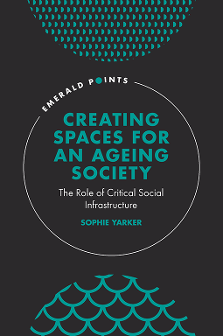
Prelims
Creating Spaces for an Ageing Society
ISBN: 978-1-83982-739-6, eISBN: 978-1-83982-738-9
Publication date: 17 November 2021
Citation
Yarker, S. (2021), "Prelims", Creating Spaces for an Ageing Society, Emerald Publishing Limited, Leeds, pp. i-ix. https://doi.org/10.1108/978-1-83982-738-920211010
Publisher
:Emerald Publishing Limited
Copyright © 2022 Sophie Yarker. Published under exclusive licence by Emerald Publishing Limited
Half Title Page
Creating Spaces for an Ageing Society
Title Page
Creating Spaces for an Ageing Society
The Role of Critical Social Infrastructure
By
Sophie Yarker
The University of Manchester, UK

United Kingdom – North America – Japan – India – Malaysia – China
Copyright Page
Emerald Publishing Limited
Howard House, Wagon Lane, Bingley BD16 1WA, UK
First edition 2022
Copyright © 2022 Sophie Yarker. Published under exclusive licence by Emerald Publishing Limited.
Reprints and permissions service
Contact: permissions@emeraldinsight.com
No part of this book may be reproduced, stored in a retrieval system, transmitted in any form or by any means electronic, mechanical, photocopying, recording or otherwise without either the prior written permission of the publisher or a licence permitting restricted copying issued in the UK by The Copyright Licensing Agency and in the USA by The Copyright Clearance Center. Any opinions expressed in the chapters are those of the authors. Whilst Emerald makes every effort to ensure the quality and accuracy of its content, Emerald makes no representation implied or otherwise, as to the chapters' suitability and application and disclaims any warranties, express or implied, to their use.
British Library Cataloguing in Publication Data
A catalogue record for this book is available from the British Library
ISBN: 978-1-83982-739-6 (Print)
ISBN: 978-1-83982-738-9 (Online)
ISBN: 978-1-83982-740-2 (Epub)


About the Author
Sophie Yarker is based in the Manchester Institute for Collaborative Research on Ageing at The University of Manchester having previously held postitions at Aberystwyth University and Newcastle University. She has an academic background in Sociology and Human Geography with a PhD in the latter from Newcastle University. Sophie has written on the subject of local belonging and attachment, urban change and age-friendly communities and published work in both academic journals and reports for third sector organisations. From 2021 she has been working on the ‘Population ageing and urbanisation’ project funded by the Leverhulme Trust which is an interdisciplinary and cross-national comparative research project into ageing in place in cities. Sophie is also Deputy Director of the Manchester Urban Ageing Research Group.
Acknowledgements
This book would not have been possible without the insights, collaboration and support of a number of people and organisations. The ideas informing my work on social infrastructure emerged from my time as Research Fellow on the Ambition for Ageing Programme. I would therefore like to thank the programme staff based at the Greater Manchester Centre for Voluntary Organisation, in particular John Hannen, Kirsty Bagnall and Sarah Wilkinson, for their contributions towards the ideas within this text and for their continued interest in the work. This book has also benefited from funding from The National Lottery Community Fund and the Leverhulme Trust and support from the Greater Manchester Ageing Hub and the Manchester Institute for Collaborative Research on Ageing.
I am hugely grateful to have found and become involved with the Manchester Urban Ageing Research Group whose research interests and expertise have inspired and helped develop my interest in social infrastructure and age-friendly communities. I would like to give special thanks to Chris Phillipson and Tine Buffel for their continued support, invaluable academic guidance and the opportunity to write this book in the first place.
I would like to acknowledge the anonymous reviewers of both the book proposal and earlier drafts of the manuscript for their supportive and helpful comments which have no doubt improved the end result. I would also like to thank the team at Emerald Publishing for their patience and advice needed to bring the book to fruition.
Finally, the majority of this book was written in 2020 during several national lockdowns in response to the coronavirus pandemic. My experience of those lockdowns would have been very different had it not been for the many socially distanced brews and laughter I shared with the women who lived in my building; the women who have now become some of my dearest friends. Therefore, I would like to thank Ruth Cousins, Chanel Goy and Emily Sayle for their unfailing support and friendship during this time.
- Prelims
- 1 Thinking Infrastructurally about an Ageing Society
- 2 Understanding Social Infrastructure and Social Connections
- 3 Outside Venues and Public Spaces
- 4 Organised Activity, Public Services and Institutions
- 5 Commercial Venues
- 6 Everyday Spaces of Intergenerational Encounter
- 7 Pressures on Social Infrastructure: Urban Development, Austerity and the Coronavirus Pandemic
- 8 An Infrastructural Approach to an Age-Friendly Recovery
- References
- Index